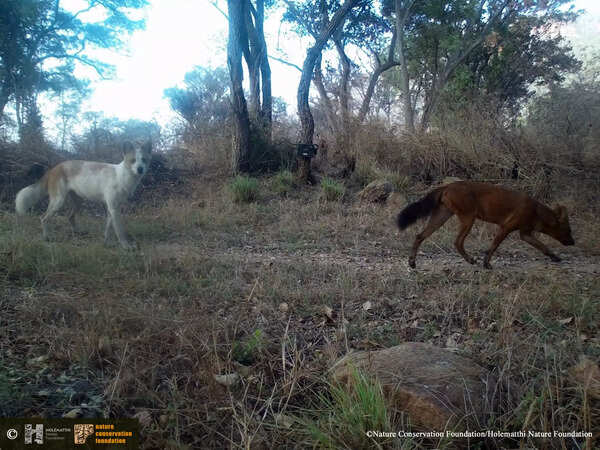Researchers in Karnataka document first-ever albino dhole – Times of India
Monitoring leopards as part of a long-term leopard population study, researchers led by Sanjay Gubbi and his team of Nature Conservation Foundation and Holematti Nature Foundation have photo documented the albino dhole. “Albinism is a colour aberration disorder with a total lack of melanin in hair, eyes and skin. Albinism is recorded in mammals, birds and reptiles. But this is the first-ever record of albinism in dholes from India or from its entire distribution ranges spread over 11 countries,” said Gubbi in an official release. In India, Dholes are protected under schedule II of the Wildlife Protection Act 1972.

As per the records, though albino dholes have never been recorded in the wild, a melanistic dhole has been recorded in Gaddesal of Coimbatore Forest Division in Tamil Nadu in 1936 by a hunter, naturalist, coffee planter and Scotsman RC Morris. Interestingly, Gubbi and his team, over the last 15 years, have focussed more on the outside of charismatic landscapes such as Bandipur, Nagarahole and have come up with multiple varieties of faunal diversity.
According to the researchers, the partial albino dhole is part of a pack of six other dholes and to date, it has been recorded four times in the camera traps. “There are also remote chances that this individual could be an interbreed between a domestic dog and dholes. This can only be ascertained if DNA testing of the individual is carried out,” opined a researcher. The Cauvery landscape which had remained largely unexplored has thrown up several surprises due to the meticulous research and documentation by experts and thereby getting national attention for the Karnataka Forest Department for its conservation work.
In 2014, the same researchers’ team documented the first-ever record of honey badgers for Karnataka from the same area. In 2017, a smooth-coated otter was recorded inside Roerich Estate in Bengaluru. Similarly in 2018, Indian Gazelles (Chinkara) were documented in the extreme South of Karnataka close to Bengaluru. Recently in 2022, Gubbi’s team spotted a melanistic leopard after a gap of two years at the Biligiri Ranga Temple (BRT) Tiger Reserve.
Dholes or the Indian Wild dog are an endangered canid species found in forests and scrubland in 11 Asian countries. Their population is threatened largely due to the depletion of wild prey, habitat loss, disease and free-ranging domestic dogs. As per the International Union for Conservation of Nature (IUCN) Dholes are already extinct in Afghanistan, Korea, Mongolia, and other countries. Dholes, in a pack, are led by an alpha male and female. Only alpha males and females breed in the pack while all others in the pack help the parents to bring up the pups.
For all the latest Education News Click Here
For the latest news and updates, follow us on Google News.

